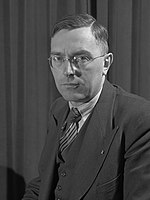World Chess Championship 1935
| Portraits | ||
|---|---|---|
| Alexander Alekhine | Max Euwe | |
| nation |

|

|
| status | Defending champion world champion since 1927 |
challenger |
| Age | 42–43 years | 34 years |
The World Chess Championship 1935 was the 15th duel for the world title in chess . From October 3 to December 15, 1935, defending champion Alexander Alekhine and his challenger Max Euwe played 30 games in 13 cities in the Netherlands , after which Max Euwe was the new world champion with 15.5: 14.5 points.
Two years later, Euwe lost the title at the 1937 World Chess Championship with 9.5: 15.5 points back to Alekhine.
prehistory
In the winter of 1933/34 Max Euwe decided to challenge the world chess champion Alexander Alekhine to a duel for the world championship. For this purpose, a confidante of Euwe founded the National Nederlandsche Comité Wereldkampioenschap Schaken , which was primarily supposed to raise money for the challenge. Even before the duel with Bogoljubow , Alekhine received the challenge of Euwe, in the event of a victory against Bogoljubow against Euwe for the world title.
On May 28, 1935, a contract was signed between Euwe and Alekhine, which regulated the conditions of the world championship. The duel began on October 2nd after the opening by the Minister for Education, Art and Science , Jan Rudolph Slotemaker de Bruine . The first move was carried out by the Mayor of Amsterdam.
Venues
The game was played in Amsterdam (1st, 2nd, 3rd, 8th, 9th, 12th, 13th, 18th, 20th, 23rd, 25th, 28th, 29th and 30th game), Den Haag (4th, 11th, 22nd and 27th game), Delft (5th and 24th game), Rotterdam (6th game), Utrecht (7th game), Gouda (10th game), Groningen (14th game) . Game), Baarn (15th game), 's-Hertogenbosch (16th game), Eindhoven (17th game), Zeist (19th game), Ermelo (21st game) and Zandvoort (26th game).
course
Alekhine initially took the lead and seemed to be defending the world title safely as Euwe gradually caught up with the points. Euwe won successively both the 20th game with White and the 21st game with Black in the same variant of the Slavic Queen's Gambit . The 26th game won by Euwe, the so-called Pearl of Zandvoort , achieved particular fame . For the last game, over two thousand people gathered at the venue, hundreds more waited in front of the building despite a heavy snow storm. Hundreds of people again flocked to the editorial offices, where journalists analyzed the trains on the demonstration board.
| 1 | 2 | 3 | 4th | 5 | 6th | 7th | 8th | 9 | 10 | 11 | 12 | 13 | 14th | 15th | 16 | 17th | 18th | 19th | 20th | 21st | 22nd | 23 | 24 | 25th | 26th | 27 | 28 | 29 | 30th | Victories | Points | |
|---|---|---|---|---|---|---|---|---|---|---|---|---|---|---|---|---|---|---|---|---|---|---|---|---|---|---|---|---|---|---|---|---|
| Alekhine | 1 | 0 | 1 | 1 | ½ | ½ | 1 | 0 | 1 | 0 | ½ | 0 | ½ | 0 | ½ | 1 | ½ | ½ | 1 | 0 | 0 | ½ | ½ | ½ | 0 | 0 | 1 | ½ | ½ | ½ | 8th | 14½ |
| Euwe | 0 | 1 | 0 | 0 | ½ | ½ | 0 | 1 | 0 | 1 | ½ | 1 | ½ | 1 | ½ | 0 | ½ | ½ | 0 | 1 | 1 | ½ | ½ | ½ | 1 | 1 | 0 | ½ | ½ | ½ | 9 | 15½ |
literature
- Dr. A. Alekhine and Dr. M. Euwe: Alekhine - Euwe 1935 . Julius Kittl's successor. Mähr.-Ostrau-Leipzig 1935.
- Max Blümich : Alekhine-Euwe, the competition for the 1935 World Chess Championship . Publishing house of the Neue Leipziger Zeitung, Leipzig 1935.
- Salo Flohr : Euwe-Aljechin, de wedstrijd om het wereldkampioenschap schaken . Algemeen Handelsblad, Amsterdam 1936.
- Hans Kmoch : Diary of the Alekhine-Euwe competition . Publisher of the Wiener Schachzeitung, Vienna 1936.
- Savielly Tartakower : Zooals ik het zag. De fraaiste partijen van de match Dr. Euwe- Dr. Alekhine, October 3 - December 15 1935, om het wereldkampioenschap schaken . De Telegraaf, Amsterdam 1936.
Web links
- Report at chessgames.com (English)

